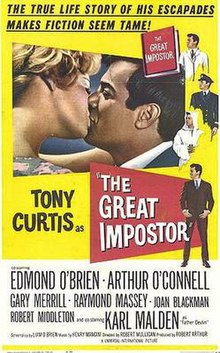The Great Impostor
| The Great Impostor | |
|---|---|
 Theatrical release poster | |
| Directed by | Robert Mulligan |
| Screenplay by | Liam O'Brien |
| Based on | The Great Imposter 1959 book by Robert Crichton |
| Produced by | Robert Arthur |
| Starring | Tony Curtis Frank Gorshin Gary Merrill Edmond O'Brien Arthur O'Connell Karl Malden Raymond Massey |
| Cinematography | Robert Burks |
| Edited by | Frederic Knudtson |
| Music by | Henry Mancini |
Production company | Universal International Pictures |
| Distributed by | Universal Pictures |
Release date |
|
Running time | 113 minutes |
| Country | United States |
| Language | English |
| Box office | $3 million[1] |
The Great Impostor is a 1961 American comedy-drama film based on the story of an impostor named Ferdinand Waldo Demara. Loosely based on Robert Crichton's 1959 biography of the same name, it stars Tony Curtis in the title role and was directed by Robert Mulligan. The film only generally follows Demara's real-life exploits, and is much lighter in tone than the book on which it is based.
Plot
As he is arrested by the state police on an island in New England, a man born as Ferdinand Waldo Demara, but known by many other identities, recalls the events that brought him to this point.
Demara quit high school as a boy and joined the U.S. Army. He wanted to become an officer, but his lack of a high school diploma prevented it. On a whim, he fakes a set of credentials and becomes a U.S. Marine.
When his lie is detected, Demara, facing military jail time, fakes his suicide and hides out in a monastery, applying to become a Trappist monk. In spite of his best efforts, he is asked to return to the regular world. He is eventually identified as a wanted Marine and imprisoned in a military prison. There, on the eve of being released early for good behavior, Demara inveigles the warden to describe the details of his life to him. Once free, he steals the warden's identity and lands a job as the aide to the warden of a large Texas penitentiary, where he takes up with the man's daughter, Eulalie, after she pursues him. When a new inmate that he knew in military prison recognizes him in the Texas penitentiary, Demara is threatened by blackmail and once again flees.
He joins the Royal Canadian Navy, using the forged credentials of a doctor. After falling in love with an RCN nurse, Catherine Lacey, Demara is assigned to a destroyer as the ship's doctor bound for the war in Korea. He is immediately pressed into performing a tooth extraction on the ship's captain. In Korean waters, he treats nineteen South Korean battle casualties, including three that need immediate surgery. The soldiers survive, and he is hailed as a hero. On shore, he sets up a hospital for the local Koreans and treats all who need help.
The ensuing international publicity of his exploits reaches the doctor he is impersonating, and Demara is exposed and is once again faced with military imprisonment. As a court-martial looms, Nurse Lacey, the ship's captain, and others who have seen Demara's good side vow to testify on his behalf, feeding an already heavy media frenzy. Weighing potential disrepute reflecting on the Royal Canadian Navy against his stellar RCN service, the board of inquiry instead gives him a swift, under-the-radar general discharge. Demara next becomes a teacher in rural New England when he is finally apprehended by state police, but he easily escapes again.
The FBI determines to track down and finally capture this great impostor. Demara arrives at FBI headquarters in his new guise as a federal agent assigned to hunt down his true self.
Cast
- Tony Curtis as Demara
- Edmond O'Brien as Capt. Glover
- Gary Merrill as Pa Demara
- Karl Malden as Father Devlin
- Raymond Massey as the Abbot
- Joan Blackman as Lt. Catherine Lacey
- Arthur O'Connell as Warden Chandler
- Jeanette Nolan as Ma Demara
- Sue Ane Langdon as Eulalie
- Frank Gorshin as Barney
- Robert Middleton as Lt. Brown
- Mike Kellin as Clifford Thompson (inmate)
- Dick Sargent as Hotchkiss
- Doodles Weaver as Farmer Hauling Fertilizer
- Jerry Paris as Defense Lieutenant
- Cindi Wood as WAC Lieutenant
Awards
- Nominee Best director - Directors Guild of America (Robert Mulligan)
Reception
A.H. Weiler of the New York Times wrote: "...the film is not a harebrained exaggeration of the facts. But the story, enhanced by the serio-comic talents of Tony Curtis in the title role, add up to an odd-ball, but engaging, movie. ...Variety, it's been pointed out, is the spice of life, and Demara's life, as presented here, appears to be spicy beyond compare, but the record backs our adventurer fully. ...Suffice it to say that Mr. Curtis, running this gamut of adventures, seriously as well as with a wink, contributes the necessary light touch that makes palatable this derring-do based on factual data."[2]
See also
- List of American films of 1961
- Catch Me If You Can, a 2002 movie starring Leonardo DiCaprio
- The Pretender, a TV series
References
- ^ "1961 Rentals and Potential". Variety. 10 Jan 1961. p. 58.
- ^ "Movie Reviews". The New York Times. 2023-04-03. ISSN 0362-4331. Retrieved 2023-04-04.
